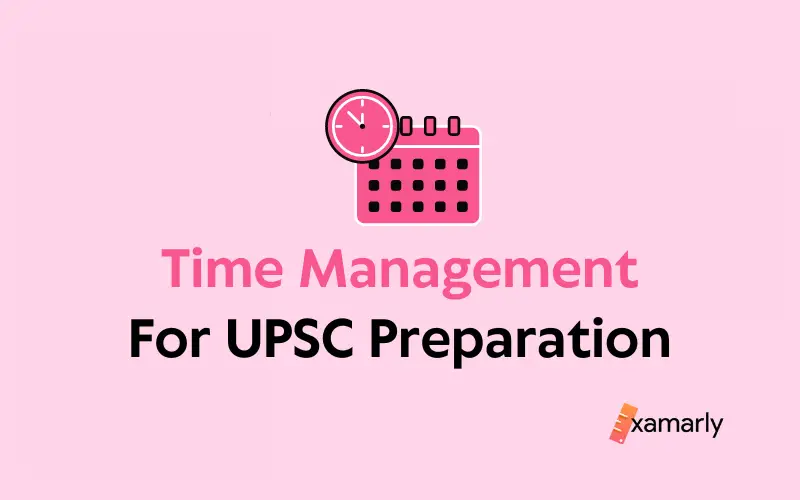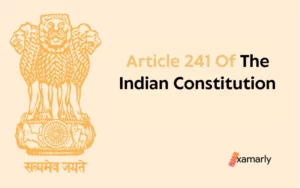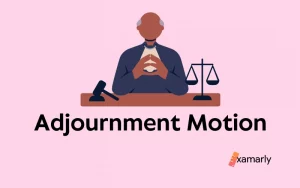Time management is essential while preparing for an elite exam like the CSE. Even your most diligent efforts will be useless if you lack the appropriate skills of time management for UPSC preparation. It will also cause mental stress, which is directly harmful to your performance.
UPSC is a tough exam & if you’re preparing for it, you need to be efficient with your time management skills. In this article, we’ll guide you with important tips throughout your preparation process so that you can make each day of your preparation count.
- Significance of Time Management for UPSC Preparation
- 9 Effective Tips on Time Management for UPSC Preparation
- 1. Sketch Out a Proper Study Schedule
- 2. Divide and Rule
- 3. Set Realistic Goals
- 4. Don’t Stick to the Topic for Too Long
- 5. Have a Break for Stress Management
- 6. Maintain a Revision Cycle
- 7. Schedule Distractions
- 8. Keep Weekends for Answer Writing & Mock Tests
- 9. Maintain a Healthy Lifestyle
- Time Management Tips for UPSC Prelims
- Time Management Tips for UPSC Mains
- Pomodoro Technique of Time Management for UPSC
- Summary
- FAQs on Time Management for UPSC Preparation
Significance of Time Management for UPSC Preparation
Time organization for UPSC preparation continues to be a significant concern/question for many applicants. We have seen that many have been able to qualify UPSC Civil Service Examination in their maiden attempt with a year/month of preparation, whereas others have been struggling despite 2-4 years of continuous preparation.
Have you ever wondered the reason behind this?
Well, to clarify it, the number of years you prepare for isn’t important. What probably counts is whether you were able to maintain your preparation optimally balanced and in-depth. Hence, your chances of qualifying for the exam are very high if you basically have two things:
- Your UPSC preparation strategy comprises a good understanding of the depth and breadth of every subject.
- You manage to study according to the study plan you made. In short, hour management skills are equally important.
This competitive exam demands a year-long consistency and dedication taking into consideration the vast syllabus. So whether you’re a full-time aspirant or a working professional preparing for UPSC, time management is an everyday need. With these simple tips, you can ensure better utilization of the clock.
9 Effective Tips on Time Management for UPSC Preparation
To speed up your preparation process and get started with effective hour management for IAS preparation, try to implement each of the approaches provided below:
1. Sketch Out a Proper Study Schedule
One needs to create a reliable schedule that one can follow in order to pass the UPSC Exam. Toppers succeed because of discipline and strict adherence to time, remember not to make a harsh study schedule that you can’t follow after 2 or 3 days.
For example, 3 to 4 hours for going through books and highlighting important points, and another 1 or 2 hours for jotting down the points which you have read the whole day. This will aid you to analyze your subject knowledge on a daily basis.
Also, Read: Time table for UPSC preparation
2. Divide and Rule
Preparing for every phase of UPSC requires you to read a lot of study material. Another crucial time management strategy is to divide the syllabus into smaller pieces and make plans in accordance.
This will enable you to cover every topic in detail without omitting anything crucial. It will also give you adequate time for revising before moving on to the next topic. From covering NCERT to other books, dividing it into micro-topics will help you cover a large portion of the syllabus in less number of hours without making you feel bored.
You might also like to read:
3. Set Realistic Goals
It’s important to set realistic goals. Setting unrealistic goals is not going to help you achieve success in any field, let alone the CSE. Instead of setting unattainable goals for yourself, consider the truth of the situation and set achievable objectives.
Once you have done this, work towards achieving these goals by putting in the maximum effort every day until they are achieved! This is yet another crucial piece of advice for customizing your time management plan for UPSC preparation.
4. Don’t Stick to the Topic for Too Long
If you are unable to understand anything, then leave it and move to the next portion which will assist you in saving time. Don’t worry about the topic you have left. Read it in the future with a fresh mind so that there might be a chance that you grasp it quickly.
Also, instead of focusing on portions that you know very well, direct your attention to weak areas. Keep in mind that you have limited time to complete a portion of the syllabus.
Related Article: How To Stay Motivated For UPSC Preparation?
5. Have a Break for Stress Management
Stress is among the most frequent causes of failure in UPSC. Candidates unable to cope with stress are unable to perform well in the exam. Therefore, it is important that you should have a proper break after around every 2-3 hours of studying.
After taking a break, you should pick up your preparation again.
This will allow you to concentrate on your studies without being distracted, and will also allow you to effectively manage your time. It prevents boredom, helps in improving your concentration level, and will ultimately help you do well on the exam.
A break helps manage your stress, which is one of the most crucial components in scheduling your UPSC preparation.
6. Maintain a Revision Cycle
Although it is vital to cover the entire syllabus in a specific time frame, revisions are equally important. Try to revise periodically, which means you won’t forget any question/topic studied before.
After completing every second topic try to revise the whole thing that you have studied so far using self-made short notes of previous topics.
This will enable you to keep old chapters in your mind along with the new ones and hence bridge the gap between old and new concepts. The secret to handling both the study and revision cycles is proper time allocation.
Read Also: Revision Strategy For UPSC.
7. Schedule Distractions
We know very well that most of us love to use smartphones, laptops, PCs, and so on. As discussed in our blog on how to use the internet for UPSC preparation, though these gadgets provide ample aid to preparation, getting carried away with them can be a big hurdle. Hence, start scheduling time to use the internet & gadgets and use only the sources that do not give you the stimulus to get distracted.
8. Keep Weekends for Answer Writing & Mock Tests
Besides your daily study routine, book your weekends for answer writing sessions and mock tests. Answer writing sessions will enable you to write error-free answers in a prominent way. A full-length mock test will enable you to analyze your weak areas on which you can work in time to improve them.
Otherwise, you won’t get enough time in the future for such things as you have to revise the entire syllabus once again before the exam. Divide study time and practice efficiently so that none gets disturbed by the other.
Related Articles:
9. Maintain a Healthy Lifestyle
Maintaining a healthy lifestyle is another crucial piece of advice for UPSC preparation. If you focus your attention only on your academics, it could have a seriously negative impact on your health. Do not exert yourself so much that it leads to stress, sleepless nights, and feeling tired every next day.
Remember it is a year-long exam and you must study consistently every day. It is a marathon that requires consistency, not a 100-meter race. Exercising, having a nutritious diet, and getting 7-8 hours of sleep will, besides making you healthy, rejuvenate you from within and keep you motivated.
Time Management Tips for UPSC Prelims
Here are some tips to help you manage your time effectively while preparing for the UPSC Civil Service Prelims:
- Create a study plan: Divide the syllabus into smaller and manageable parts, allocate time for each section, and stick to the plan.
- Prioritize: Focus on the most important and high-scoring topics first.
- Practice test-taking: Regularly take mock tests and practice papers to gauge your progress and identify your weaknesses.
- Manage distractions: Avoid distractions like social media, phone calls, and irrelevant chats.
- Take breaks: Regular term breaks are essential for maintaining focus and avoiding burnout.
- Revise regularly: Regular revision is crucial for retaining what you have learned.
- Stay positive and focused: Maintaining a positive attitude and staying focused on your goals are key to success.
Also read: How To Prepare For UPSC Prelims And Mains Together?
Time Management Tips for UPSC Mains
Some tips for managing your time effectively while preparing for the UPSC Civil Service Mains are as follows:
- Create a study plan: This helps you avoid last-minute cramming and ensures that you cover the entire syllabus in time.
- Prioritize: Allocate more time to these topics, while giving less time to the lower-priority ones.
- Practice writing: Practice writing essays, answer writing, and other types of questions to develop your writing style and build your confidence.
- Manage distractions: Create a study environment that is conducive to concentration and focus.
- Take breaks: Take short breaks every hour or so, and make sure to get enough sleep, exercise, and eat nutritious food.
- Revise regularly: Make it a point to revise what you have studied each day, and allocate time for comprehensive revision closer to the exam date.
- Stay positive and focused: Surround yourself with positive and supportive people, and avoid negative influences.
Pomodoro Technique of Time Management for UPSC
The Pomodoro Technique is a time management method that can be applied to preparing for the UPSC. The Pomodoro Technique works by breaking down your study sessions into focused intervals of time, separated by short breaks. Here’s how you can apply it to your UPSC preparation:
- Decide on a task: Choose a task related to your UPSC preparation, such as studying a particular topic or writing an answer.
- Set a timer: Use a timer or an app to set the Pomodoro interval, typically 25 minutes.
- Work on the task: Work on the task for the full Pomodoro interval, focusing solely on the task and avoiding distractions.
- Take a break: After the Pomodoro interval, take a short break, typically 5 minutes. During the break, you can stretch, grab a drink, or do something to refresh your mind.
- Repeat: Repeat the Pomodoro intervals and breaks until you have completed the desired number of Pomodoros. For example, you might choose to do 4 Pomodoros, with a longer break after the fourth one.
- Reflect: After completing the desired number of Pomodoros, reflect on what you have accomplished, what you have learned, and what you can do better in the future.
The Pomodoro Technique can help you focus and get more done in less time, making it an effective time management tool for UPSC preparation.
Additionally, breaking down the preparation into focused intervals of time, it can help to reduce stress and prevent burnout.
Advantages of the Pomodoro Technique
The Pomodoro Technique has several advantages when it comes to time management, including:
- Increases productivity: By breaking down work into focused intervals of time, the Pomodoro Technique helps you to concentrate and get more done in less time.
- Reduces distractions: The technique encourages you to focus solely on the task at hand, reducing the number of distractions and interruptions you face.
- Prevents burnout: The technique encourages you to take short breaks regularly, which can help to reduce stress and prevent burnout.
- Improves time management skills: The Pomodoro Technique helps you to better manage your time and prioritize tasks, making it easier to meet deadlines and achieve your goals.
- Encourages self-discipline: By following the Pomodoro Technique, you are training yourself to be more self-disciplined, which can be useful in other areas of your life as well.
- Improves focus and concentration: By forcing yourself to focus for short periods of time, the Pomodoro Technique can help you to improve your focus and concentration skills, making it easier to study for exams like the UPSC.
- Increases motivation: The Pomodoro Technique can help to increase your motivation, as you are able to see the progress you are making and the tasks you are completing.
By incorporating the Pomodoro Technique into your UPSC preparation, you can benefit from these advantages, helping you to manage your time more effectively, reduce stress, and achieve your goals.
Drawbacks of the Pomodoro Technique
Like any other time management technique, the Pomodoro Technique also has some drawbacks, including:
- Inflexibility: The Pomodoro Technique requires strict adherence to specific time intervals, which may not be suitable for everyone or every task. Some tasks may require longer or shorter intervals, and the technique may not be flexible enough to accommodate these needs.
- Does not accommodate for multitasking: The Pomodoro Technique encourages you to focus on one task at a time, which may not be practical for some tasks that require multitasking.
- May increase stress: For some people, the pressure to complete a task within a specific time interval may increase stress levels, particularly if they are already struggling with time management.
- May not be suitable for deep work: Deep work, such as writing, coding, or problem-solving, may require longer and uninterrupted intervals of time, which may not be possible within the Pomodoro Technique’s structure.
- Requires discipline: The Pomodoro Technique requires discipline and self-control to stick to the time intervals, which can be challenging for some people.
- May be difficult to measure progress: The Pomodoro Technique measures progress in terms of completed intervals, which may not always reflect the actual progress made towards a goal.
- May not work for everyone: Finally, the Pomodoro Technique may not work for everyone, as different people have different learning and working styles. Some people may find it too structured, while others may find it too flexible.
These drawbacks should be considered when deciding whether the Pomodoro Technique is the right time management method for your UPSC preparation. It is important to assess your own needs and work style and choose a time management method that works best for you.
Summary
By employing a preparation plan and proper time management techniques, you can significantly increase your odds of passing the UPSC Exam. In your search for tips on time management for UPSC preparation, we hope this blog gave you some key insights.
Also, read our articles on:
FAQs on Time Management for UPSC Preparation
What is the best time to start preparing for UPSC?
There is no specific hour to start preparing for UPSC as it depends on various factors such as your current work commitments, your academic background, and personal circumstances. However, most people start preparing for the exam 1-2 years in advance to allow enough time for comprehensive preparation.
How many hours per day should I study for UPSC?
It is recommended to study for at least 6 hours a day for UPSC preparation. However, the actual number of hours you need to study may vary based on your current knowledge, learning style, and other personal circumstances. It is important to create a study schedule that allows you to balance effectively between preparing for the exam and taking care of other commitments. Related article: How Many Hours Of Study Is Required For UPSC.
How much time does it take to prepare for UPSC?
Although it depends from person to person, experts suggest that with efficient preparation scheduling and management one can crack Civil Services Exam in a year.
Is studying 7 hours a day enough for UPSC?
With an effective study plan, hours, and stress management one can complete the syllabus and revision in months. Many people claim to have studied this much and succeeded in Civil Services Exams. However, there can be no specific answer regarding study hours. Although any extra hour you can give to your preparation without losing energy or your health is worth it.
How to manage time for reading newspapers for UPSC preparation?
Reading newspapers is an important part of UPSC preparation as it helps you stay up-to-date with current events and enhances your general awareness. To manage effectively, you can allocate a specific hour each day for reading newspapers and stick to this schedule. Additionally, it may be helpful to prioritize the most important sections, such as editorials, and allocate more for these sections.






